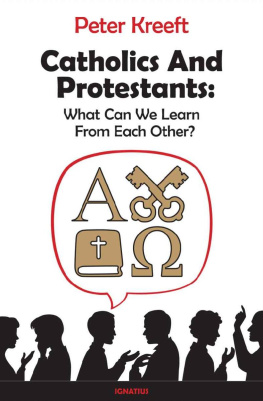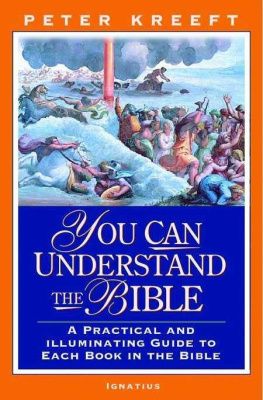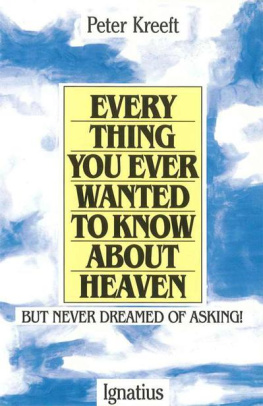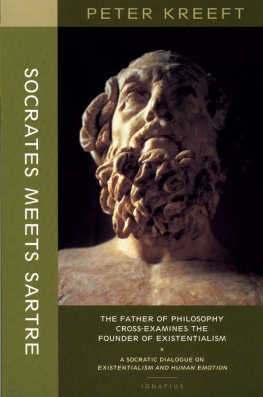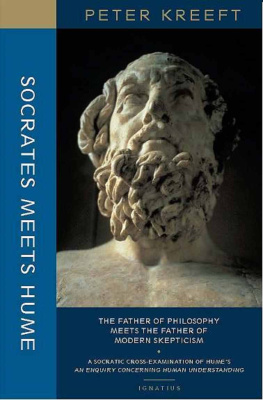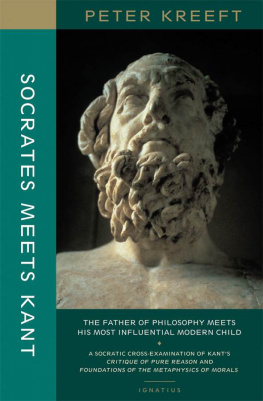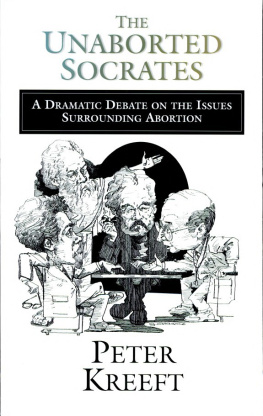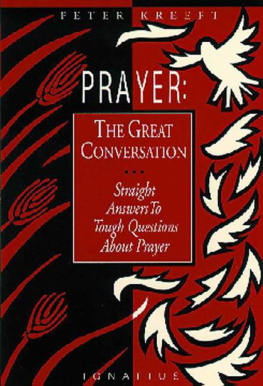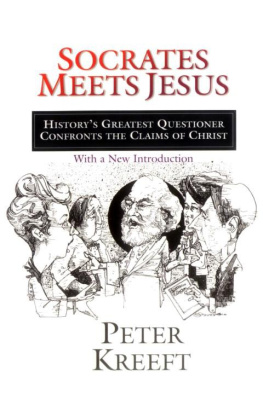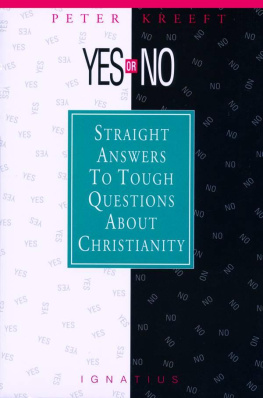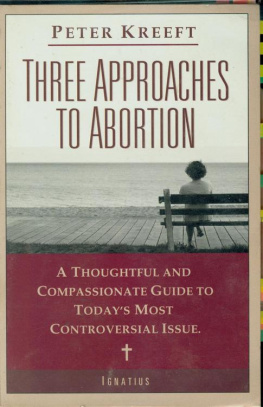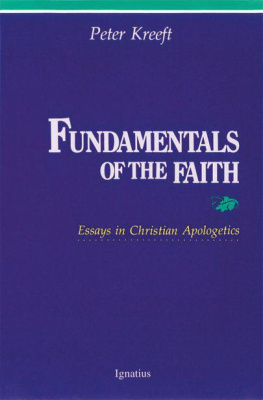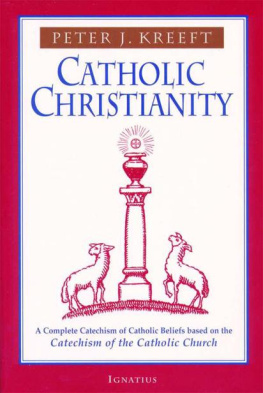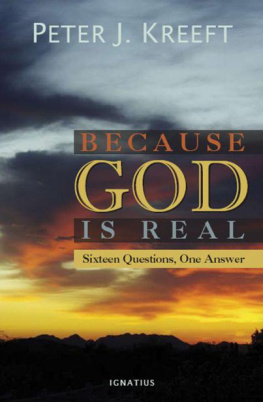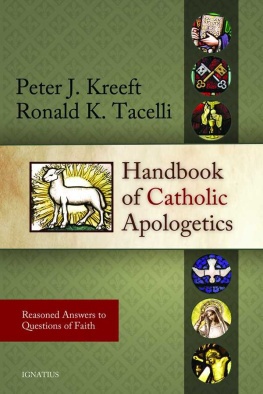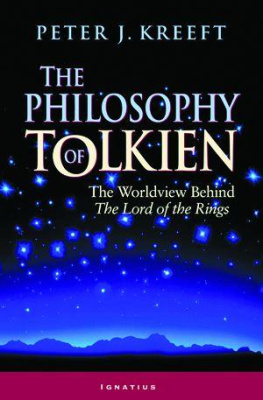CATHOLICS AND PROTESTANTS
PETER J. KREEFT
Catholics and Protestants

WHAT CAN WE LEARN FROM EACH OTHER?
IGNATIUS PRESS SAN FRANCISCO
Unless otherwise indicated, Scripture quotations are from Revised Standard Version of the BibleSecond Catholic Edition (Ignatius Edition) copyright 2006 National Council of the Churches of Christ in the United States of America. Used by permission. All rights reserved worldwide.
Art and cover design by Davin Carlson
2017 Ignatius Press, San Francisco
All rights reserved
ISBN 978-1-62164-101-8 (PB)
ISBN 978-1-68149-745-7 (EB)
Library of Congress Control Number 2015953758
Printed in the United States of America
For Kevin Offner,
who persuaded me
to write this book
Contents
Introduction
I will count this book a success if you the reader remember just two or three of my points five years later. Of how many books can you remember three of their points five years later?
This book does not have a scholarly style, outline, or length. Each chapter is short and makes a single, simple point. That is how we remember things: in points, not in outlines. Thus, we say, Oh, I remember that point. We dont say, Oh, I remember that outline. We put points together in outlines only after we see them. This book is only about seeing them. I set them out for you to see, and then arrange, if you wish, but above all to apply to your life. I am only the little boy who says, Look!
The topic invites this unusual approach because we cannot see much of the big picture that is Gods providential design for the healing and reuniting of His Church. We do not understand how He is doing it, but we can see that He is doing something today that was never done before: Protestants and Catholics are sincerely loving and listening to each other. What will happen next? God only knows.
So I deliberately resisted the temptation to rearrange these separate looks in a more logical order, or even to be sure there was no overlapping of content between any two of them, as there usually is in separate pieces. Instead, I kept them in a random order because that was the order in which they occurred to me. Read them in any order you wish. They are independent, like islands, or angels.
I could have outlined them. I love outlines, and I fancy I am quite good at inventing them. The habit comes from reading Saint Thomas Aquinas a lot. In fact, it is almost an addiction. But I refused to do sonot out of laziness (though I am lazy) but out of charity, for you, the reader, for your greater delight and the points greater power. Pascals Penses would have been spoiled if God had allowed him to live long enough to organize and outline them into a book, as he had planned. So God in His mercy struck him dead at a young age for our sakes. OK, God, Ive learned my lesson: You dont have to kill me to make this book readable.
Thats all I need to say. The best introductions are short. Heeeeres Johnny! was a classic.

But I should say one thing about issues.
There are many issues that divide Protestants and Catholics. This book does not claim to resolve them. It is neither a complete book of Catholic apologetics (though it contains some key Catholic arguments) nor a complete manual for ecumenical reconciliation (though it contains some key arguments to the effect that the two sides are much more reconcilable than most people on both sides think). It is written from a point of view that is catholic (universal) as well as Catholic (Roman).
That catholicism with a small c , that universality, is one of the reasons I am a Roman Catholic. For I discovered more and more, the more I looked at the issues in the two thousand years of rich Church history, that the Catholic Church habitually sees both sides of every issue: e.g., Gods oneness and threeness; Christs divinity and humanity; predestination and free will; faith and works; Bible and Church; grace and nature; the absolute and eternal worth of the individual soul and the social priority of the common good. Whenever two positive things seem to conflict, the Church sorts them out as some kind of a both-and instead of a simple either-or. The Church is in the marriage business with ideas as well as people. (That does not mean, of course, that negative ideas cannot disguise themselves as positive ones, or that heresies can easily be identified by their negative grammar.)
So here, right up front, is my master argument for Catholic thought: It is catholic. Catholics believe everything in the Bible, including the Protestant stuff. Lutherans may believe in Galatians versus James, faith versus works, but Catholics believe both. Calvinists may believe in predestination versus free will and Arminians in free will versus predestination, but Catholics, like Augustine and Aquinas, believe both. Whatever truths Protestantism teaches, Catholicism also teaches. Catholicism is inclusive, not exclusive. It does not like words like merely or only or sola . Sola scriptura , sola fide , and sola gratia were the three slogans of the Reformationas if scripture excluded Tradition instead of presupposing it and referring to it and affirming it; and as if faith excluded works instead of necessarily producing the works of charity by its very essence, as mothers produce babies; and as if grace set aside nature and human nature rather than using and perfecting nature (and natural reason).
But those are apologetical arguments. This book is not about apologetics but about ecumenism.
Protestants may err by seeing too little in Catholicism, but I do not want to err by seeing too little in Protestantism. So I will perhaps surprise or even offend some Catholics by seeing what they may judge as too much truth in Protestantism. My defense is that I believe I can find it all in Catholicism. This is not an attempt to practice a kind of shuttle diplomacy or political compromise between two philosophies external to each other. Im not importing some Protestant points into Catholicism. Im just reminding Catholics and Protestants alike that these points are already there.
1
A Lutheran Parable
Sometimes truth can be best told by fiction. Parables are short fictions that tell important truths. I claim the following parable to be true.
In the year 1517 the Angel of God was sent to Germany to a passionate and pious Augustinian monk who had just discovered the essence of Christianity for the first time in his life and was on fire to share and spread this fire (not his fire, Christs fire) in order to rekindle his brothers and sisters with it, since in many of them the fire looked tamped down, tamed, and tepid under the weight of its own massive and magnificent ecclesiastical fireplace.
Brother Martin, you have been raised up by the all-seeing providence of God, said the Angel, and given a great task. Though you are not the saint that Francis was, your divinely appointed task is the same task God gave to Francis three centuries ago when He said, My Church is in ruins; repair it. Through the failures of your own life and the agonizing sufferings of your spirit, through the grace that brought you through them, He has shown you not just your needs but also what His Church needs today: nothing less than to rediscover her true strength and joy by rediscovering her own very foundation in the Gospel. You must remind her of this simple, liberating truth that you have discovered.
Brother Martin replied, I joyfully accept this task. But how should I do this? What path shall I take?
Next page
